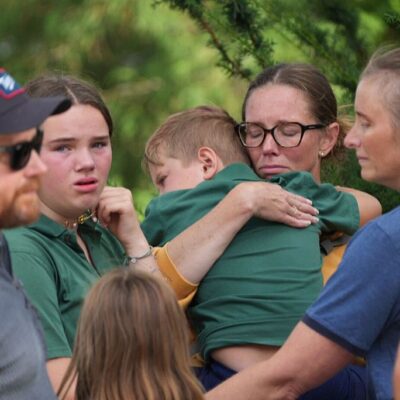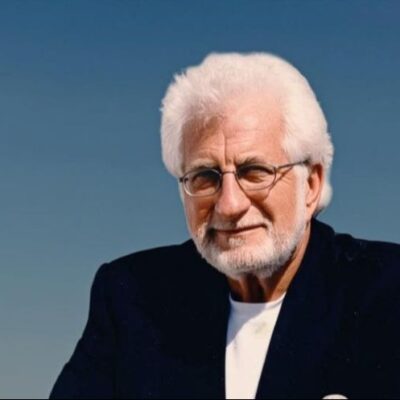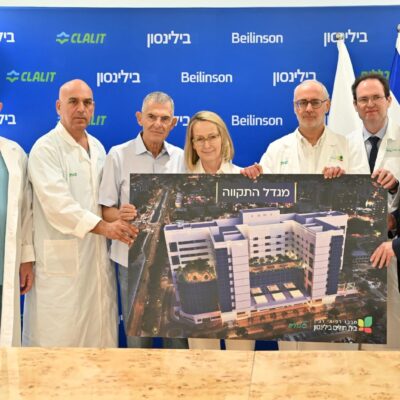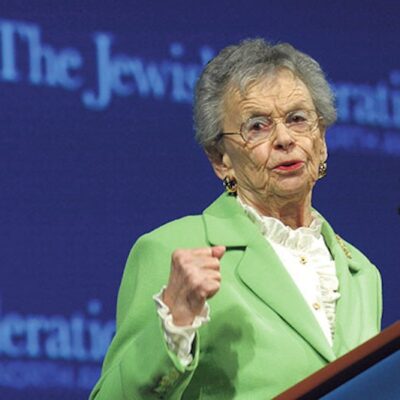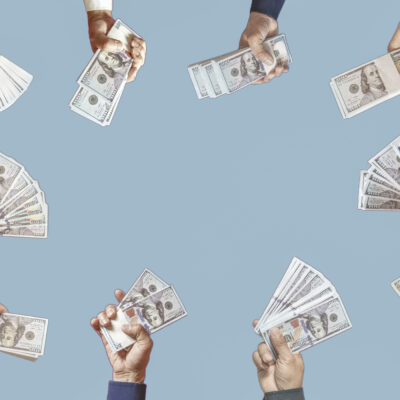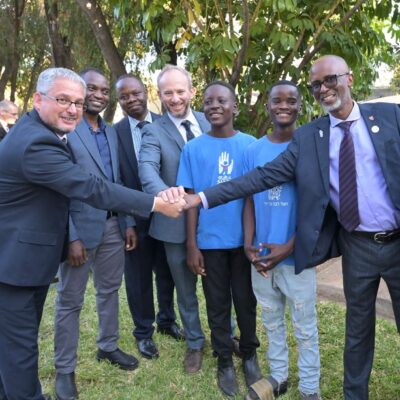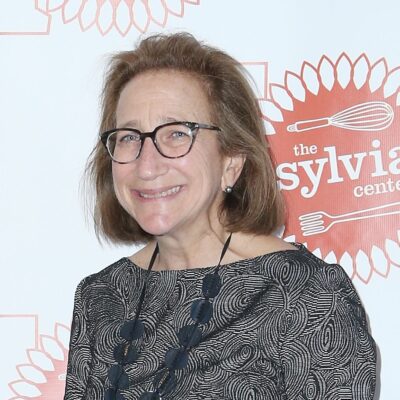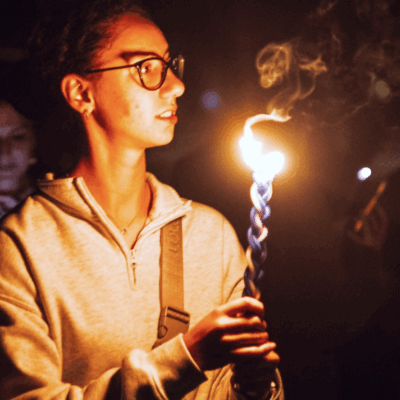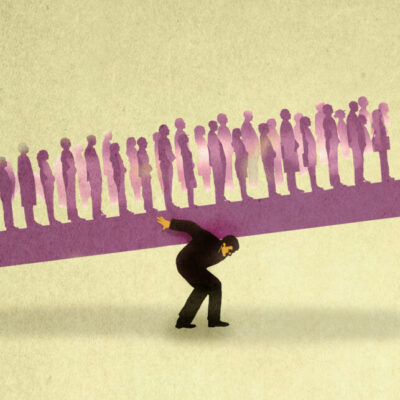The Urgency of Now:
Building Community by Connecting Values to Action

By Lisa Colton, Rabbi Josh Weisman, and Ingrid Elliott
Which is greater, study or action? Rabbi Tarfon answered, saying:
Action is greater. Rabbi Akiva answered, saying:
Study is greater. Everyone answered, saying: Study is greater
because it leads to action.
– Babylonian Talmud Kiddushin 40b
Over the past year many leaders in the Seattle Jewish community have been discussing how we grow and deepen in response both to shifting generations and also changing demographics in Seattle, where the overall population and economy are booming, and thus the Jewish community is evolving as well. Over a series of communal conversations we’ve been exploring what the “DNA of Jewish Seattle” would be – something that would be felt consistently across our region, yet expressed in a diverse range of ways.
Last October a group of climate-concerned Jews in Seattle met to explore connecting our Jewish values to real action on climate issues. We studied Noah. We learned about local policy discussions taking place. We wondered, what could we do that would have a real impact?
The brainstorm that followed was the genesis of the Urgency of Now: Seattle’s Jewish Climate Festival, a city-wide series of 18 diverse events offered by 16 Jewish communities, held together by a common purpose, shared values, and an orientation toward action. The three of us – all involved with Kavana Cooperative – felt passionate about making the most of Tu BiShvat this year and seized the opportunity to create a platform for the Jewish community to drive energy and action, while allowing every leader and organization maximum creative freedom.
This Festival felt like a manifestation of so many of these attributes of communal DNA we have discussed: values-based, easy on-ramps, moral courage, collaborative, embracing ‘new power,’ innovative and entrepreneurial, and integrated into our wider community. Harnessing the power of diverse communities to do their own things while also offering a common thread to tie various events together creates something more powerful than the sum of its parts.
Based on that experience, here are a few lessons we took away around approaching collaboration in the face of complexity.
Common Purpose: Designing Platforms for Collaboration
We knew that many synagogues and other organizations would plan something for Tu BiShvat as they do every year, and we wondered what it would look like to invite them into something larger, with common purpose, appealing to a wider demographic than might otherwise show up at their annual Tu BiShvat seder, and driving toward meaningful change. We approached the opportunity with hopefulness and enthusiasm, an educational mindset and a collaborative spirit. We envisioned a wide variety of opportunities open to anyone in the greater Seattle area, each of which would connect them to community, values, and action.
We started with modest invitations each of which was swiftly responded to with an enthusiastic “yes.” And as word spread, more and more collaborators wanted to throw their doors open, add momentum to the Festival, and be part of something meaningful. Within a month, in addition to our keynote event focused on climate policy solutions, we had 18 events from 16 collaborators, including young adult seders, guided nature hikes, an art workshop, a singing circle, and more, offering much, much more than any one community could have done on its own. The communities involved spanned the diversity of Seattle’s Jewish community – five denominations and pluralistic communities, Sephardi and Ashkenazi, synagogues and organizations serving Jews of all ages.
Jewish action and identity must be integrated with our wider society to speak to the issues of our times, to engage a wide cross-section of Jews, and to succeed in building positive momentum. Climate change is both an ecological and a social problem, and we believe that responses to it should focus as much on equity as on “parts per billion.” So, in carrying out this festival, we not only purposefully reached out across the diversity of the Jewish community, but also centered diverse voices in our keynote, including passionate advocates for environmental justice from within and beyond the Jewish community. We put the Jewish community and allied communities together at the center of a vital discussion in our city.
Jewish Values: Connecting “Life–to–Text”
There is perhaps no greater goal in contemporary Jewish programming than to make Judaism and Jewish life relevant, and for young adults and teens, nothing is more relevant than climate change. If we want today’s generations to take Judaism seriously, we must offer them Jewish ways to confront the existential crises of their lives, as Amy Asin and Rabbi Esther Lederman’s so eloquently encouraged designing for “life–to–text” in their recent eJP article. Between our earth-based traditions like Tu BiShvat, our countless sacred texts that inspire and challenge us, and the potential power of today’s Jewish community to put its shoulder to the wheel to advance policies that will safeguard the future, we believe that Judaism has so much to offer this urgent moment.
We designed the kickoff of the festival to be educational. Three sessions at Limmud Seattle in late January laid the groundwork. Then came our keynote event featuring Nigel Savage of Hazon, Seattle City Council members Tammy Morales and Dan Strauss (both Jewish), and Indigeneous environmental leader Matt Remle (Lakota) who was instrumental in the development of the Seattle Green New Deal. We infused the event with inspirational framing (cities generate 70% of emissions, so cities are a great place to start to solve the problem); Jewish knowledge from Nigel (and see our source sheet here); and perspective that Seattle – the largest city in the “Evergreen State,” where residents tend to care for and appreciate the environment, and where the economy is booming – has to get this right to be an (energy efficient) light unto the rest of the nation and other cities.
Oriented Toward Action
One of our goals was to start conversations in the Jewish community about how we can put our passion to use in confronting climate change through concrete, ambitious local initiatives. In a sign of just how serious Seattle is getting about climate, the Seattle City Council in 2019 unanimously passed the “Seattle Green New Deal,” a resolution to eliminate climate pollution in Seattle by 2030, while addressing historical and current injustices and creating thousands of good, green, well-paying jobs. At the same time, climate is one of the top issues of concern in our Jewish community. We wanted to link our community’s concern with opportunities for action like SGND, educating those who weren’t aware of this initiative and generating discussion about it. To do this meant earning the attention of a wide cross section of the greater Seattle Jewish community, awakening a connection between Jewish values and local action on climate.
We built a website (Squarespace, nearly free!) as the centerpiece of our communications strategy. This central destination allowed us to amplify all the opportunities in the community, earn media placement through local environmental partners, neighborhood blogs, the Federation and more, and to reach the people where they are (regardless of if they were affiliated with a local Jewish organization, or read an e-newsletter).
Through it all, we worked with the mantra “Do what you do best, and network the rest,” the famous maxim from Beth Kanter and Allison Fine’s book The Networked Nonprofit. While giving complete freedom to every partner hosting their own event, we offered content to share in their marketing, emails, events, and follow up, including Jewish texts and prompts for discussion and opportunities for action. Nearly every collaborator used these resources in some way to connect action to community and to Jewish learning, thereby deepening their own events, creating a city-wide shared narrative, and mobilizing people into action.
We hope that this festival will become a model for filling ancient vessels like Tu BiShvat with renewed purpose, and inspire other communities to see opportunities for fresh and impactful collaboration to tackle complex issues. Hazon’s Nigel Savage remarked that Seattle’s Jewish Climate Festival is “an admirable model for other communities to adopt and adapt. It makes sense to bring Jewish institutions, local partner organizations, and civic activists together on this topic. The world needs the voice and actions of faith communities, and we can’t be the kind of Jewish community that many of us aspire to be if we’re not raising our game in relation to the climate crisis.” It takes a unified and concerted effort to make change in our climate crisis, as well as to build and activate dynamic, relevant and powerful Jewish communities. And the converse is just as true – it’s precisely through engaging with an existentially important issue like climate change that we are most likely to bring together the Jewish community – and all communities, for that matter – in ways that simultaneously reflect our diversity and give us common purpose.
We are feeling pretty optimistic about these goals here in Seattle, where hundreds of Jews have gathered over the past few weeks to reflect, recharge, reconnect, and reach for new opportunities to face this issue and seize the opportunity for bold, creative and meaningful action.
As Rev. Dr. Martin Luther King, Jr said in 1963, in words that inspired the name of our festival, “We are now faced with the fact that tomorrow is today. We are confronted with the fierce urgency of now. In this unfolding conundrum of life and history there ‘is’ such a thing as being too late. This is no time for apathy or complacency. This is a time for vigorous and positive action.”
Lisa Narodick Colton is the president of Darim Consulting, and works to help the Jewish community and other nonprofits align their strategy and communication for success in today’s networked age. She recently helped JFNA design the engagement track of FedLab. She is a Kavana partner in Seattle. She can be reached at lisa@darimconsulting.com.
Rabbi Josh Weisman is the Jewish Emergent Network Rabbinic Fellow at Kavana Cooperative in Seattle. Prior to attending the pluralistic Rabbinical School of Hebrew College, Rabbi Josh worked as a grass-roots organizer and Jewish nonprofit professional for over a decade in the Bay Area. In addition to the festival, his recent climate work includes co-founding the new Jewish tree-planting initiative JTree. Contact Josh about Jewish climate, sustainability, and other justice initiatives at rabbijosh@kavana.org.
Ingrid Elliott is an art historian and independent curator specializing in Cuban art, as well as a partner and board member of Seattle’s Kavana Cooperative. When her 19-year-old son said he wasn’t going to have kids unless we got climate change sorted out, Ingrid decided to roll up her sleeves and get to work. She subsequently joined the leadership team for the campaign for Seattle’s Green New Deal (SGND), and also serves as a liaison between the campaign and Earth Ministry. Contact Ingrid to learn more about the SGND at elliottshapiro@mac.com.

